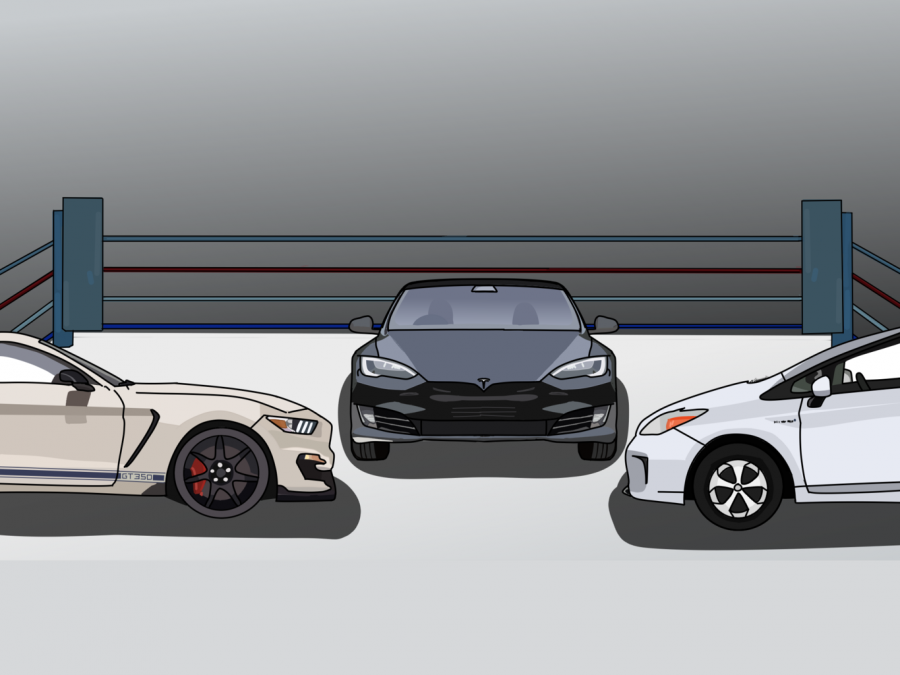The auto industry is headed towards an electrifying future
December 14, 2020
In recent years, electric cars have been steadily growing in popularity. Whether it’s the comforting thought of saving a polar bear, the economic benefits of not buying gas, or the sheer speed of an electric motor, more people than ever are getting behind the wheel of an electric car. Is it the right choice?
When it comes to your wallet, electric vehicles will do less damage than an equivalent gas car. A prime example is the Mini Cooper. The classic, economical hatchback is offered with either a traditional gas-powered drivetrain or an electric drivetrain. The price of the electric version starts at $29,900, while the gas-powered version starts at $22,400. The good news is that people who buy the electric version are eligible for a federal tax credit of up to $7,500. In addition, Mini states that the electric version will save consumers around $4,500 in fuel costs over five years.
According to AAA, in Minnesota, regular-grade E87 gas currently costs $2.13 per gallon. However, the University of California Berkeley and the Energy Institute at Haas School of Business conducted a study on the cost of charging electric cars, and they found that the amount of electricity equivalent to a gallon of gas costs just $0.66. That means that on average, electricity costs $1.47 less per gallon, so the continual cost to power the car will be cheaper in an electric vehicle. Also, Consumer Reports stated that electric vehicles also cost consumers half as much as gas vehicles in maintenance and repairs. Therefore, electric vehicles, despite the higher sticker price, will save consumers more money during the lifetime of the vehicle. This means that when taking into account the starting price of the vehicle as well as the various costs of fuel and maintenance, electric vehicles are less expensive than their gas-powered equivalents.
Another thing that is appealing to consumers is the image of the electric vehicle as being very environmentally friendly. Society has grasped the notion that electric cars are better for the planet, but when taking a step back and looking at every aspect of the automotive industry, it becomes evident that it may not be entirely true. The issue is that gas cars and electric cars each damage the environment in different ways. While electric vehicles are more energy-efficient than gas cars, the production of the batteries they use requires nickel and cobalt, which need to be mined. The extraction of nickel is extremely toxic to the surrounding environment, as it releases toxic fumes into the air, contaminates water, and kills plant life. On the other hand, gas cars produce a higher amount of emissions than electric vehicles. Electric vehicles do not directly emit greenhouse gasses into the environment, but they do use energy from power plants that do emit greenhouse gasses. Due to Minnesota’s methods of producing electricity, the average electric vehicle accounts for the same amount of greenhouse-gas emissions as a car that gets 51 miles to the gallon, according to the Union of Concerned Scientists. That leaves a very short list of cars in current production that are more environmentally friendly than the average electric vehicle.
A common thought is that a hybrid vehicle is the best of both worlds. In some ways, it is, but in others, it isn’t. Hybrids are generally more expensive than their gas-powered siblings but don’t save you as much money as their electric siblings. While it is true that they make gas drivetrains more fuel-efficient by assisting the engine with electric power, they don’t save as much money in fuel costs as fully-electric vehicles. Hybrids also harm the environment in the same ways that both gas and electric cars do. They require batteries, which means they contribute to nickel mining like electric cars do, and they run on gas, so they emit greenhouse gasses as gas cars do. For someone who wants a car that is economical and environmentally-friendly, hybrids don’t fulfill these goals as well as electric vehicles.
Finding the right vehicle can feel like a nightmare, but there are a few new vehicles that may make it easier. Over the last two to three years, major car manufacturers have added electric vehicles to their lineup, and a few new electric car firms have emerged with their own models. There are currently over 20 different electric vehicles for sale in the U.S and at least 15 more that are set to be released in the next few years.
Electric motors have the potential to produce truly astonishing amounts of power—levels of power that are extremely difficult to produce with a gas engine. Nonetheless, when it comes to car enthusiasts, the majority of them are still resisting the temptations of electric vehicles, opting instead for a traditional gas-powered vehicle when choosing a project car. There are many reasons why they argue that gas vehicles are better: they’re easier to work on, there are more ways to modify them, their engines make a nice noise, you can have them with a manual transmission, there are more aftermarket modification and tuning companies, and almost all classic and retro cars are gas-powered. Those are just a few of the many reasons that car enthusiasts often prefer gas cars for personal enjoyment. However, there have been a few all-electric hypercars that have been released in recent years that car enthusiasts love. Although the majority of car enthusiasts prefer gas cars for project cars and personal enjoyment, many also believe that electric cars make for great daily drivers.
Whether it’s the economic benefit, environmental friendliness, or speed, there are many reasons to buy an electric vehicle. In today’s world, electric vehicles are becoming increasingly necessary, as the supply of oil and natural gas continues to dwindle. For that reason, among others, the world’s automobile manufacturers are introducing more and more electric vehicles to their range of cars. For these reasons, buying an electric vehicle is definitely a good choice.











